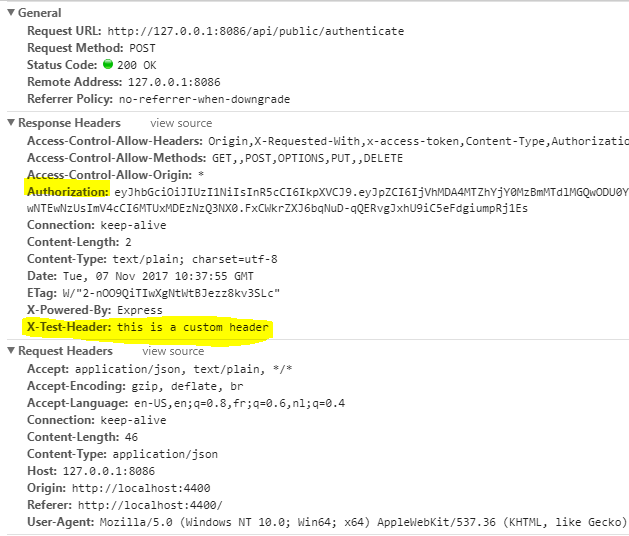In the context of a server automatically renewing a token, I'm struggling with the basics: Obtaining header data from a response.
It does not seem to be CORS related as my Node/express allwos the Authorization/x-access-token and reponds accordingly (see network tab screeencap below).
The first step I want to see working is simply reading the header from the response. See my code, it's boilerplate as found in the docs. Event getting "Content-Length" returns null.
auth-service.ts
login(username:string, password:string):Observable<boolean>{
this.loggedIn = false;
return new Observable( (observer:Observer<boolean>) => {
const body = {user: username, pwd: password};
const url = this.config.API_ENDPOINT_PUBLIC_AUTH;
this.httpClient.post(url, body, {
responseType: 'text',
observe: "response"
}).first().subscribe(
(response:HttpResponse<string>) => {
// DEBUG
console.log(response.headers.get('Authorization'));
console.log(response.headers.get('X-Test-Header'));
console.log(response.headers.get('Content-length'));
this.token = response.headers.get('Authorization');
this.storeToken(this.token);
this.currentUser = username;
this.loggedIn = true;
this.authChanged$.next('auth');
observer.next(true);
},
(err) => observer.next(false),
() => {},
);
});
}
Console output:
null
null
null
Compare this to the contents of my network tab for this request:
Needless to say my HttpInterceptor doesn't work either - upon being provided "Authorization" header in a response, it uses the value as new token. This to implement auto-renewal of tokens:
token.interceptor.ts
intercept(request: HttpRequest<any>, next: HttpHandler): Observable<HttpEvent<any>> {
const authService = this.injector.get(AuthService);
const token = authService.getToken();
if(token){
request = request.clone({
setHeaders: { 'x-access-token' : token }
});
}
return next.handle(request).do(
(event: HttpEvent<any>) => {
if (event instanceof HttpResponse) {
const response:HttpResponse<any> = (<HttpResponse<any>> event);
const authorizationHeader = response.headers.get('Authorization');
console.log('Authorization header value: ' + authorizationHeader);
if(authorizationHeader){
authService.setToken(authorizationHeader);
}
}
},
(err: any) => {
if (err instanceof HttpErrorResponse){
if (err.status === 401) {
this.router.navigate(['/']);
}
}
});
}

